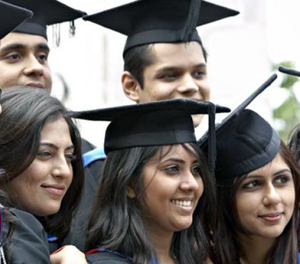Washington, Jul 15: Indian students have a "high level of concern" about potential study in the US and a large number of them worry about their physical safety and about the feeling of being unwelcome, according to a new survey.
The Institute of International Education (IIE) suggested that the final outcome of the US Supreme Court order in June that temporarily upheld President Donald Trump's executive order to restrict entry of nationals from six Muslim majority countries to America weighs on their mind.
With over a million international students pursuing higher education in the US and contributing more than $36 billion to the American economy, the stakes are high, it said.
Founded in 1919, the IIE is a US-based not-for-profit working to build peaceful and equitable societies by advancing scholarship, building economies and promoting access to opportunity. It focuses on International Student Exchange and Aid, Foreign Affairs, and International Peace and Security.
The IIE said that the survey results indicate the highest level of institutional concern regarding enrollment of students from the Middle East, followed by India.
Thirty-one per cent of institutions are very concerned that Middle Eastern students who have accepted offers of admissions may not arrive on campus in the fall, and 20 per cent are very concerned that Indian students may not arrive on campus, it said.
"This uncertainty raises valid concerns as to whether students from the Middle East may be deterred from US study," it said.
"Securing and maintaining a visa is reported as the top concern among these students and was reported by 46 per cent of institutions, while feeling welcome in the United States was an almost equal concern, with 41 per cent of institutions noting so from their conversations with students," it added.
According to the IIE, survey findings suggest that Indian students "have a high level of concern about potential study in the United States, 80 per cent of institutions responded that physical safety was the most pronounced concern for Indian students, while 31 per cent of institutions indicated that feeling welcome was also a concern."
"Although application totals appearing to largely remain stable, yield rates and a concern about personal safety suggest the possibility that Indian students may not continue to grow as the second largest international group in US higher education," IIE said.
"Their concerns may lead some Indian students to accept admissions offers from other leading host countries, especially from those that issue student visas more quickly."
The IIE, however, said despite widespread concerns that international student interest in the US might be flagging, the evidence from this survey suggests that "this is not the case."
It said that interest among international students in the US remains steady overall despite the current environment.
According to the study, modest drops in yield - the percentage of students that attend a college or university after having been offered admission - at some institutions may be offset by steady or increased yield at other schools.
Among the 112 colleges that provided data there was a 2 per cent decline in the expected yield rate this year compared to last year.
Overall, international undergraduate yield has dipped slightly from 26 to 24 per cent from fall 2016 to fall 2017.
The two percentage point decline is comparable to shifts in the domestic (US) student yield reported by institutional respondents, which fell from 30 to 28 per cent over the same time period, it said.
According to the study, there is however little concern about students from Europe and Canada arriving on campus in the fall and only modest concern about students' arrival from China and Latin America.





Comments
Add new comment